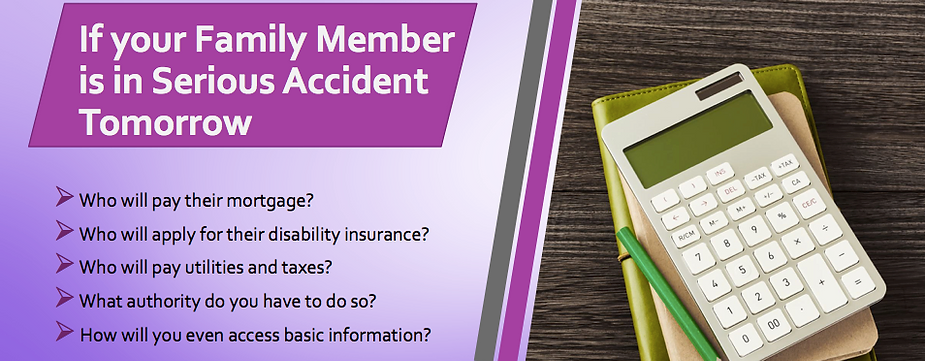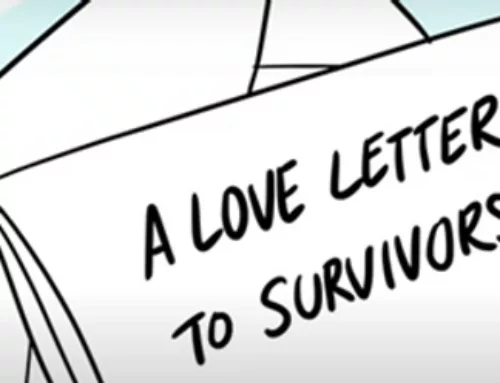A summary from our Support for Seniors Webinar Series
We were fortunate this month to partner with the Edmonton Community Legal Centre (ECLC) to present: Medical Directives, Powers of Attorney, & Other Important Documents under our Support for Seniors Series of webinars. This blog is a highlight of that presentation, along with a link to the slides, and other resources to help you determine what important documents you might need for your health, financial, & legal needs for when you need them. This is about protecting yourself and your loved ones from being vulnerable to abuse at a time when you may be at your most vulnerable – when you find yourself sick, injured, or incapacitated in some way.
- How do you want to live?
- How do you want to be cared for?
- What are you wishes while you are still alive but maybe unable to make decisions for yourself?
It’s about planning for a future with dignity and respect and the best care possible within your financial means and within a legal framework. Leaving it to chance, to the whims of others, to the government, can be difficult not only for you but your loved ones as well. A little work as ‘insurance’ can save you from some tragic and difficult consequences. Alberta doesn’t allow for an automatic transfer of power and decision making.
We know some of this can seem daunting and a little overwhelming, so we’ve tried to break it down to the basics. Keep in mind, you should always consult legal advice (and if you can’t afford legal advice, scroll down below for free and/or affordable legal services that you may be able to access.) These documents are not just for those who are wealthy! It is about avoiding leaving your care in limbo when you may really need someone to step in, so you don’t lose your life savings and home and really, your dignity and some quality of life. .
There are several types of decision-making documents for those who are impacted by illness or injury. We’re not talking about after death but for those still living who are incapacitated in some way and unable to make decisions for either a short time or for an indefinite amount of time.

What is an Enduring Power of Attorney (EPA)?
An Enduring Power of Attorney appoints somebody to take care of your financial affairs while you are alive, but usually after you have lost capacity. It’s what we consider a ‘trusteeship’ arrangement. There are 2 types of EPA:
- Immediate: this Power of Attorney comes into effect immediately and shall continue in effect even though you may become mentally incapacitated, and it allows for a gradual increase of assistance.
- Springing: this Power of Attorney only comes into effect at a specified time or on the occurrence of a specified contingency in the future. A specific event might be when you lose mental capacity. Your EPA should state who must make a written declaration that this specific date or contingency has occurred. You can give this power to your Attorney or to another individual, such as your doctor. If you do not state who can make this declaration, then two medical practitioners must make a written declaration.
An EPA can only be done when you have the mental capacity to do so. You can appoint 1-2 (or more) people as your ‘Attorney(s)’ whom you trust to handle your finances for you. This could include a spouse or long-term partner, adult children, or another person who you trust. It’s always good to name an alternate in the event something happens to the person you’ve appointed. If you have no one, there are trust companies who can act as your Attorney, but they can be expensive.
When you’re doing an EPA, you want to make sure there is specific information on how you would like spouses/partners and dependents to be taken care of in the event you’re unable to do so (again, with respect to financial matters). It’s also important to outline how you want any real estate or property to be handled because in Alberta, laws around land titles can be tricky to navigate. You don’t want your loved ones trying to meet your wishes AND being embroiled in costly property disputes.
What’s a Personal Directive (PD)? A Personal Directive is a legal document that appoints someone else to make decisions about your personal, non-financial matters such as health care and housing should you become unable to do this yourself. It’s what we consider a ‘guardianship’ arrangement.
A PD can only be done when you have the mental capacity to do so. You can appoint an ‘agent’ to deal with your health care/personal matters when you become unable to do so (upon declaration of incapacity). You can appoint a person who you believe is the best person to make decisions for you and make your wishes known (such as would you prefer home care or a nursing home?). This person or these persons become your agent(s) for certain things you specify when it comes to your health, medical, & personal care plans and preferences. It can help your agent make decisions about medical interventions should you enter a vegetative state and about donating your organs for transplant or medical research.
What’s Supported Decision Making?
We’ve talked about having the capacity to make these plans and put together these documents when you’re able. But what about when you have the capacity, but you need some support in your decision making?
- If you are capable of making decisions but require assistance, you can complete a supported decision-making form to appoint a ‘supporter’
- A supporter helps communicate your questions, concerns, and decisions by talking with your service providers who could include:
- health care providers
- pharmacists
- continuing care facilities
- employers
- lawyers
- A supporter has the legal authority to :
- access your personal information that’s needed for a decision you want to make
- help you make and communicate your decision(s)
What are the Alternatives to an EPA or a PD? When you’re not able to plan for the possibility of becoming ill, injured, or incapacitated in some way, the alternatives can result in you not being cared for in the way you would have wished; in not having a partner or dependents cared for as you would have done had you had the ability to do so, and can be very costly for you and your loved ones. If you do not have an EPA and become incapable of managing your financial affairs someone will need to apply to the court to obtain a trusteeship order to be appointed as your trustee. Similarly, if you do not have a Personal Directive, someone will need to apply to the court to obtain a guardianship order to be appointed as your guardian. This can result in:
- Increased costs
- Initial application $1,000 – $2,500 in legal fees and $500-$700 in medical report fees
- No control over appointment of your trustee and/or guardian
Risks & Concerns You may be concerned that you may not be properly supported by a decision maker, or they might abuse the decision-making authority you’ve given them. Or others may be concerned that you’re not being properly supported by the decision maker you’ve appointed. Please note that it’s against the law for someone to misuse an EPA or PD for their own personal benefit (unless explicitly stated in the documents) or if they are deliberately harming a client and not acting in their best interests. If you suspect this may be happening, there are ways that this can be addressed:
- With an EPA: it can be revoked; a caregiver, loved one or you, yourself (if you have capacity) can ask for an accounting of how finances have been handling/spent, you can request a court order.
- With a PD: it can be revoked; you can get a court order.
- With a Guardianship/Trusteeship: you can submit a claim to the Office of the Public Guardian & Trustee
Or, if you feel that someone you love is being abused or at risk of being abused or being taken advantage of in such situations, you can contact SAIF or your local law enforcement. Lastly, we wanted to do a quick overview of some of the most common questions related to this topic:
1. How can you avoid the misuse of your EPA or PD?
A: To avoid the misuse of your EPA or PD, start with prevention:
- make sure you have open and frank conversations with friends and family about your wishes.
- ensure you’re choosing people you trust, not because you want to avoid family ‘drama’, but people who you think will do the best job.
- you can consult with a lawyer to help you draft your documents and ensure there are checks and balances for whomever you appoint.
- you can also limit who determines your capacity or lack thereof.
- you can appoint co-decision makers to act jointly to help ensure some checks and balances, too.
2. Can a person refuse to be your agent or attorney?
A: No one is required to serve these roles for you which is why it’s so important to have these discussions and know who would be likely to say yes AND be trustworthy to take on this role should you need it.
3. Does your agent or attorney receive compensation?
A: You can specify in your documents whether you would like to compensate people for doing this for you but it’s not automatic for certain appointments (i.e. your agent) (some people can’t afford to pay their loved ones for this).
4. How does marriage, divorce, or separation affect my PD or EPA?
A. short answer is that it doesn’t. who you appoint as your agent or attorney on your documents is the person of record. Of course, you can always change your documents to reflect major changes in your life. These documents remain in effect until you revoke them, die, or the courts decide.
5. Are these documents effective outside Alberta?
A: This can be complex due to jurisdictional issues, particularly around property and land titles and whether the documents were properly executed.
6. Are documents from other provinces valid in Alberta?
A: Again, this can be complex due to jurisdictional issues, particularly around property and land titles and whether the documents were properly executed.
7. Are photocopies of the documents valid?
A: In some situations a photo copy is fine, but you will want to ensure that you have originals or certified true copies of your documents just in case they are needed.
Download Presentation Slides (delivered by Nicole Wiebe & Deema Abourizk, Dentons) How to Complete the Documents for a PD or EPA
Affordable Legal Resources in Edmonton & Area
Video: Planning for the Future: Personal Directives, Powers of Attorney & Wills

